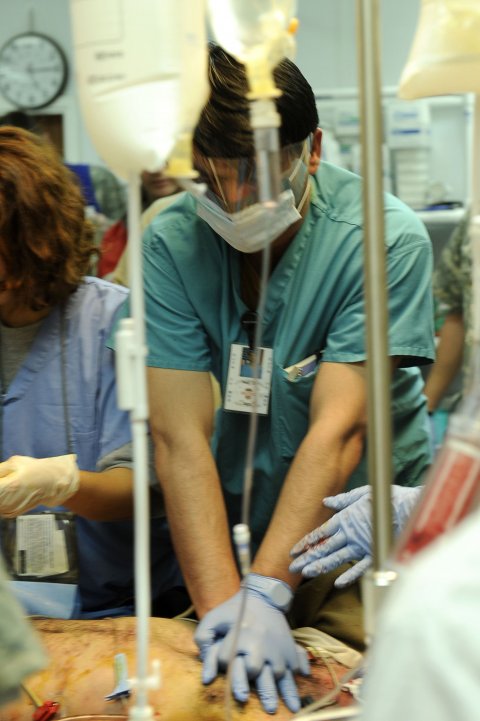News • Cardiopulmonary resuscitation
Is CPR overrated? Experts argue it might be
Patients and the general public appear to significantly overestimate the success of cardiopulmonary resuscitation (CPR) and underestimate the negative impact it can have on a person’s health, new research suggests.
US researchers have therefore recommended clinicians discuss CPR with patients and their loved ones to clarify the practice’s success rate and the real benefits and risks involved before patients or their families are asked to consent to it. Emergency physicians often talk to patients or their families about end-of-life care and the outcomes of resuscitation efforts. Patient and family preconceptions of CPR can have a significant effect on the tone of discussions and the subsequent medical care provided.
The study has been published online in Emergency Medicine Journal.

Image source: Jeromy K. Cross, U.S. Air Force, Afghanistan - cardiopulmonary resuscitation, marked as public domain, details at Wikimedia Commons
Previous studies have shown that most lay people overestimate the success of CPR and underestimate its morbidity but no studies on the subject have been carried out amongst patients and visitors in an emergency department. Patients in previous studies have cited television as a large source of their belief that rates of survival after CPR vary between 19% and 75%, whereas actual rates of survival of CPR range from an average of 12% for out-of-hospital cardiac arrests to 24–40% for in-hospital arrests. Therefore, a team of researchers from the University of California in the US carried out a survey of 500 emergency department patients and their companions to assess their expectations and examine whether or not variation in information sources, prior exposure to CPR, and healthcare experience would influence peoples’ predicted CPR success rates.
The survey was carried out amongst adults in the emergency department waiting area within a tertiary care hospital in Sacramento, California, between June and September 2016. An “optimism scale” was created to reflect expected likelihood of survival after CPR, or CPR success, under several sets of circumstances. Results showed that of the 500 respondents, more than half (53%) had performed or witnessed CPR, and/or participated in a CPR course (64%). Television was the main source of information about CPR for around 95% of respondents.
Recommended article

News • TV vs reality
Grey’s Anatomy may be distorting public expectations of trauma care
The television drama, Grey’s Anatomy, may be giving viewers a false impression of the realities of trauma care, including the speed at which patients recover after sustaining serious injuries, finds research published in the online journal Trauma Surgery & Acute Care Open. Unrealistic expectations of healthcare may be important in an era in which patient satisfaction is a key component of…
At least half of the people interviewed estimated the success rate of CPR as being more than 75% in all situations. The estimated CPR success rates were unrelated to age, sex, race, spiritual beliefs or personal healthcare experience. The vast majority (90%) of people interviewed said they wanted to receive CPR if it was possibly needed. Comments also revealed that only 28% of respondents had discussed CPR with a physician, but most participants believed that a physician should talk to them about their CPR preference.
These findings should prompt emergency department physicians to initiate discussions about resuscitation with their patients while also providing them with key information to help facilitate informed decision-making
The study had some limitations such as the fact that it took place at a single institution and for convenience, the sample only included English speakers which limits the generalisability of findings. Some participants might also have been distracted by illness or the emergency department waiting area environment. Nevertheless, the researchers conclude: “Patients and visitors to an emergency department, regardless of prior healthcare or CPR experience, overestimate the likelihood of success with CPR. These findings should prompt emergency department physicians to initiate discussions about resuscitation with their patients while also providing them with key information to help facilitate informed decision-making. When discussing CPR preferences, emergency department providers should focus on true rates of survival and outcomes in any shared decision-making conversation and should not assume that a patient or companion with healthcare experience will have realistic expectations.”
Source: The BMJ
14.07.2020











